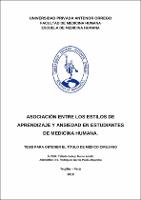Mostrar el registro sencillo del ítem
Asociación entre los estilos de aprendizaje y ansiedad en estudiantes de medicina humana
| dc.contributor.advisor | Rodríguez Garcia, Paola Alejandra | |
| dc.contributor.author | Talledo Vallejo, Marco Adolfo | |
| dc.creator | Talledo Vallejo , Marco Adolfo | |
| dc.date.accessioned | 2019-03-21T12:51:30Z | |
| dc.date.available | 2019-03-21T12:51:30Z | |
| dc.date.issued | 2019 | |
| dc.identifier.uri | https://hdl.handle.net/20.500.12759/4573 | |
| dc.description.abstract | Objetivo: Determinar qué estilo de aprendizaje es más susceptible a presentar ansiedad. Material y Métodos: Es un estudio observacional, transversal y analítico. La población de estudio estuvo constituida alumnos de Medicina Humana en el Campus Trujillo de la Universidad Privada Antenor Orrego que cursan el semestre 2018-2, El total de estudiantes matriculados fue de 2813 alumnos, de los cuales se logró encuestar a un total de 531 estudiantes, excluyéndose 97, dicha muestra represento un nivel de confianza superior al 97% correspondiente al cálculo de muestra para encuesta poblacional según el software EpiInfo®. Se utilizaron 3 cuestionarios validados con un valor α de 0.73, un cuestionario de datos generales, el inventario de estilos de aprendizaje de Kolb V3.1 y el Inventario de desorden de ansiedad generalizada (GAD-7), se utilizó estadística descriptiva, pruebas de Chi-cuadrado y T de Student. Resultados: Se encontró asociación significativa entre los estilos de aprendizaje y ansiedad clínica(p = 0,007), los estilos más predispuestos a la ansiedad clínica fueron el “Divergente” (47,76%) y “Asimilador” (30,35%), se encontró además que el estilo “Convergente” (8,46%), es posiblemente protector frente a la ansiedad clínica(p = 0,036). Otras variables asociadas significativamente a la ansiedad clínica fueron el consumo de tranquilizantes automedicados(p=0,004; OR=20,04) y el sexo femenino(p=0,022; OR=1,63). Conclusiones: Existe asociación significativa entre los estilos de aprendizaje y la ansiedad a nivel clínica(p=0,007), teniendo como estilos de aprendizaje más asociados: “Divergente”(47,76% ) y “Asimilador”(30,35%) . Se considera al estilo de aprendizaje “Convergente” como un factor protector en cuanto a la presencia de ansiedad clínica y se consideran factores predisponentes al sexo femenino y al consumo de tranquilizantes automedicados. | es_PE |
| dc.description.abstract | Objective: Determine what type of student according to their learning style is more susceptible to present anxiety. Material and Methods: It is an observational, transversal and analytical study. The study population consisted of students of Human Medicine at the Trujillo Campus of the Universidad Privada Antenor Orrego from the period 2018-2, The total number of students enrolled was 2813 students, which would survey a total of 531 students, excluding 97, said sample represented a confidence level higher than 97% i n the calculation of the population sample according to the EpiInfo® software. We used 3 validated questionnaires with an α value of 0.73, a general data questionnaire, the Kolb V3.1 learning styles inventory and the Generalized Anxiety Disorder Inventory (GAD7), a descriptive statistical analysis was made with Chi square tests and Student's T test. Results: A significant association was found between the learning styles and clinical anxiety (p = 0.007), the styles most predisposed to clinical anxiety were the ““Divergent““ (47.76%) and ““Assimilator““ (30.35%). Also was found that the ““Convergent““ style (8.46%) is possibly protective against clinical anxiety (p = 0.036). Other variables significantly associated with clinical anxiety were the consumption of self-administered tranquilizers (p = 0.004, OR = 20.04) and the female sex (p = 0.022, OR = 1.63). Conclusions: There is a significant relationship between learning styles and anxiety at the clinical level (p = 0.007), having as more associated learning styles: ““Divergent““ (47.76%) and ““Assimilator““ (30.35%). Consider the ““Convergent““ learning style as a protective factor in the presence of clinical anxiety and predisposing factors were the female sex and the consumption of self-administered tranquilizers. | en_US |
| dc.description.uri | Tesis | es_PE |
| dc.format | application/pdf | es_PE |
| dc.language.iso | spa | es_PE |
| dc.publisher | Universidad Privada Antenor Orrego | es_PE |
| dc.relation.ispartofseries | T_MED.HUMA_2538 | |
| dc.rights | info:eu-repo/semantics/openAccess | es_PE |
| dc.rights.uri | https://creativecommons.org/licenses/by/4.0/ | es_PE |
| dc.source | Universidad Privada Antenor Orrego | es_PE |
| dc.source | Repositorio Institucional - UPAO | es_PE |
| dc.subject | Salud del estudiante | es_PE |
| dc.subject | Cuestionario de salud del paciente | es_PE |
| dc.title | Asociación entre los estilos de aprendizaje y ansiedad en estudiantes de medicina humana | es_PE |
| dc.type | info:eu-repo/semantics/bachelorThesis | es_PE |
| thesis.degree.level | Título Profesional | es_PE |
| thesis.degree.grantor | Universidad Privada Antenor Orrego. Facultad de Medicina Humana | es_PE |
| thesis.degree.name | Médico Cirujano | es_PE |
| thesis.degree.discipline | Medicina Humana | es_PE |
| dc.subject.ocde | https://purl.org/pe-repo/ocde/ford#3.02.27 | es_PE |
| renati.type | https://purl.org/pe-repo/renati/type#tesis | es_PE |
| renati.level | https://purl.org/pe-repo/renati/level#tituloProfesional | es_PE |
| renati.discipline | 912016 | es_PE |
| dc.publisher.country | PE | es_PE |
Ficheros en el ítem
Este ítem aparece en la(s) siguiente(s) colección(es)
-
Medicina Humana [3084]


